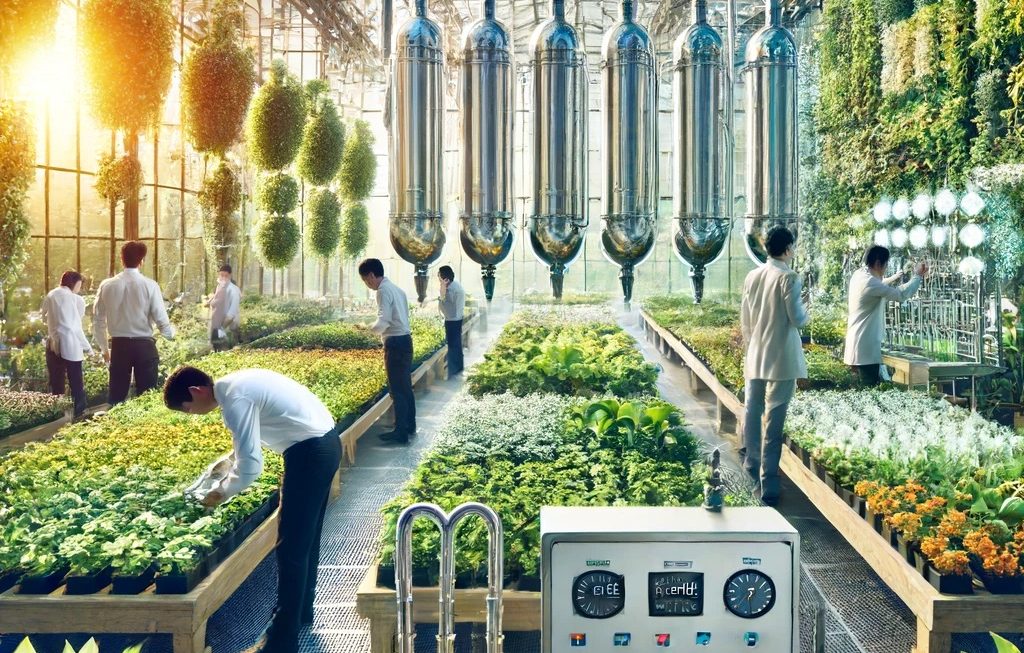Reading Time: 6min |
This time, I had the pleasure of speaking with Viktoria Oseyko, CMO of Carbominer, about their thrilling startup endeavor and their approach to Carbon Capture, which plays a crucial role in achieving our global CO2 reduction goals. Beyond the typical excitement and stress of the startup rollercoaster, this Ukrainian startup has had to navigate additional challenges, first due to COVID-19 and then the Russian attack on Ukraine.
But before we dive into this, let’s start with a summary of what Carbominer is all about.
About Carbominer
Carbominer is at the forefront of direct air carbon capture technology, with a focus not only on capturing CO2 but also on utilizing it where it is most needed. Unlike the widely discussed Carbon Capture and Storage (CCS), which aims to capture CO2 from flue gases (where concentrations are high) and store captured CO2 underground to prevent its release into the atmosphere, Carbominer’s approach to Direct Air Carbon Capture and Usage (CCU) captures CO2 from the open air (where concentrations are low) and repurposes captured CO2 for local industrial and agricultural uses.
Innovative Small-Scale Carbon Capture Devices
Carbominer’s CCU technology specializes in small scale modular carbon capture devices capable of locally capturing 50 to 250 tons of CO2 per year. This capability is ideally suited for the needs of small to medium-sized greenhouses, covering areas from 0.5 to 2 hectares. These greenhouses require specific CO2 concentrations—ranging from 800 to 1500 PPM—for optimal plant growth, depending on the type of crop. Traditionally, these greenhouses have purchased and used grey CO2 produced from fossil fuels. With Carbominer’s help, they can now replace this grey CO2 with green, sustainably captured CO2.
By targeting these greenhouses as their primary market, Carbominer is addressing a vital niche. Food is ever-needed and the agricultural sector, especially in controlled environment agriculture, consistently demands supplemental CO2 to maximize both crop yield and quality. This demand is expected to grow further with the anticipated expansion of vertical farms. Carbominer’s technology directly meets this demand, offering a customized solution that aligns with the specific CO2 needs of different crops. This approach not only captures CO2 right where it’s needed but also eliminates the need for logistics and transport-related issues.
Unique Business Model enables a major USP
On top of these technology perks, Carbominer differentiates itself from traditional carbon capture companies with a unique business model that benefits its customers directly. Rather than selling the carbon capture devices, Carbominer installs their equipment on-site at farms and charges based on CO2 consumption. This pay-per-use or subscription model eliminates the need for a large upfront investment, making it more accessible and financially feasible for farmers. This approach not only offers a sustainable solution for CO2 management but also positions Carbominer strategically in the market, offering a value proposition that is hard to match.
The Journey of Carbominer: A Family-Driven Venture with a Vision for Change
At the core of Carbominer’s journey is a commitment to effect positive change. The catalyst for this ambitious venture was Nick Oseyko’s recognition of the escalating CO2 levels and their harmful effects on health and the environment—a realization spurred by a family health issue likely caused by elevated CO2 levels. With no previous experience in climate technology, Nick was nevertheless compelled by his deep concern for future generations’ health to take a bold leap into the carbon capture field. Driven by this purpose, he utilized his engineering background to devise a solution that would not only capture carbon but also repurpose it to enhance plant growth.
Navigating Through Challenges
Carbominer’s journey toward innovation and establishing a market presence has been fraught with challenges. Since its inception, the company has encountered numerous obstacles that have tested its resilience, adaptability, and commitment to its mission.
The venture began with enthusiasm and a clear vision in February 2020, but the emergence of the COVID-19 pandemic and the subsequent global lockdown in March presented immediate and unforeseen difficulties. The pandemic severely hindered Carbominer’s early progress, as the world dealt with an unprecedented health crisis that caused widespread disruption across numerous industries. For a nascent startup, this timing was especially detrimental, affecting everything from development timelines to investor relations.
As Carbominer was starting to regain its footing post-pandemic, it faced new challenges on the geopolitical front. As a Ukrainian startup, Russia’s invasion of Ukraine posed significant obstacles, transforming what were once straightforward travel arrangements into prolonged journeys. Routes that typically took a few hours now extended to over 14 hours, necessitating detours through Poland. These logistical obstacles not only affected the mobility of Carbominer’s team but also impacted the efficiency and speed of the company’s operations and expansion efforts.
These extraordinary challenges, on top of the ‘normal’ obstacles faced by any deep-tech hardware startup—from technology development to pilot projects, understanding market demand, and securing funding—define Carbominer’s journey. Each hurdle, while impeding progress, has also strengthened the company’s determination to succeed and make a positive environmental impact.
The Bigger Picture: Carbominer’s Role in the EU’s Ambitious Carbon Capture Goals
As usual, one of the major topics I like to discuss with startup founders is their perspective on the Bigger Picture:
As the world intensifies its focus on strategies to combat climate change, the European Union has established ambitious goals for carbon capture, aiming to remove 50 million tons of CO2 from the atmosphere by 2030, with targets increasing to 280 million tons by 2040 and 450 million tons by 2050. These targets highlight the critical need for green innovations and collaborative efforts across sectors and borders to mitigate the effects of global warming. Within this comprehensive framework of climate action, Carbominer’s role, while seemingly modest with its 50-250 ton capacity devices, is crucial.
Carbominer’s technology, which centers on small-scale carbon capture devices, demonstrates the essential contribution of specialized solutions to broader environmental objectives. Although the company’s individual devices capture CO2 in the hundreds of tons, collectively, they offer a scalable and adaptable approach to carbon management.
Learning from Global Efforts
Looking beyond European borders, Viktoria sees valuable lessons to be learned from initiatives like the United States’ development of Direct Air Capture (DAC) hubs. These hubs facilitate collaboration between companies specializing in carbon capture and storage, creating an ecosystem that accelerates the deployment of carbon management technologies.
Another thing that popped into my mind when talking about the US startup ecosystem is the more readily available startup funding in the US points towards the potential benefits of a Capital Markets Union in Europe, which is currently discussed (again) and could provide the necessary financial infrastructure to support innovative startups like Carbominer, which are crucial for adressing the economic changes face driven by climate action.
Key Learnings as a Founder
The first key lesson Viktoria highlights is the importance of financial readiness. Even though a financial cushion may make the risky and tough startup rollercoaster ride easier to endure, being free from financial obligations is a must. If you have debts or high monthly obligatory spending, going on a startup journey falls into the category „brave, but why“. Everything in life should come in ist right time, so it’s important to analyze all aspects of life and set priorities as well as make a cold-blooded decision whether or not it’s the right time to proceed with your startup idea.
This valid point is also discussed in this worthwhile read by Felix Schmitt. He concludes that the best time to start a company is directly after finishing university – even though one needs tons of business advice.
The Trio of Success: Expertise, Business Knowledge, and Passion
Success in the startup world is seldom a solo endeavor. Thus, Viktoria emphasizes the importance of bringing together expertise, business knowledge, and passion as another key success factor. Founders need to either possess all of these qualities themselves or find a partner who complements their skills and vision. Expertise in the chosen field ensures the technological or service innovation meets a high standard, while business knowledge navigates the company through growth and market challenges. Above all, passion is the fuel that keeps the team motivated through highs and lows. This combination is potent for overcoming obstacles and achieving long-term success.
Even though there are ways to overcome issues with one of these areas, bringing all of them to the table, can make all the difference.
The Strategic Approach: Beachhead Market Strategy
Last but not least, Carbominer’s approach serves as a prime example of a Beachhead Market strategy, emphasizing the importance of focusing on one sharply defined market segment initially before expanding to other markets. By targeting small to medium-sized greenhouses as their primary customers, Carbominer is able to refine the technology, understand the specific needs of their clients, and establish a strong foothold in the market. This strategic focus allows for more efficient allocation of resources, enhances brand recognition, and builds a solid foundation for future expansion to neighbour markets. It’s a blueprint of concentrating efforts on a niche market as a springboard for broader market penetration.
How to help: Opportunities for Collaboration and Innovation
As Carbominer continues to make strides in the field of carbon capture and utilization, there are multiple ways for our readers to contribute to and support their mission. Here’s how you can help Carbominer in their journey:
Do you know anyone who is involved with one of the following topics? Than please reach out to me.
- – CO2 Utilization Products: Innovations that transform captured CO2 into valuable products, enhancing the circular economy and creating new market opportunities.
– CO2 Storage Solutions: Technologies specializing in the safe, efficient, and long-term storage of CO2, including mineralization and geological storage solutions, which are crucial for balancing the global carbon cycle.
– Carbon Footprint Measurement Tools for Startups: Tools and services dedicated to helping startups measure and manage their carbon footprints, particularly in logistics and transportation. These tools are essential for companies looking to understand and reduce their environmental impact.
Viktoria Oseiko’s first job was in copywriting, where she honed her skills communication and writing skills. Uniquely, she views each of her jobs, even the less ideal ones, as valuable learning experiences, refraining from labeling any as the “worst.” As a co-founder of Carbominer, she blends her marketing and communication expertise with a commitment to environmental sustainability, steering the company towards innovative carbon capture solutions.
Learn more:


